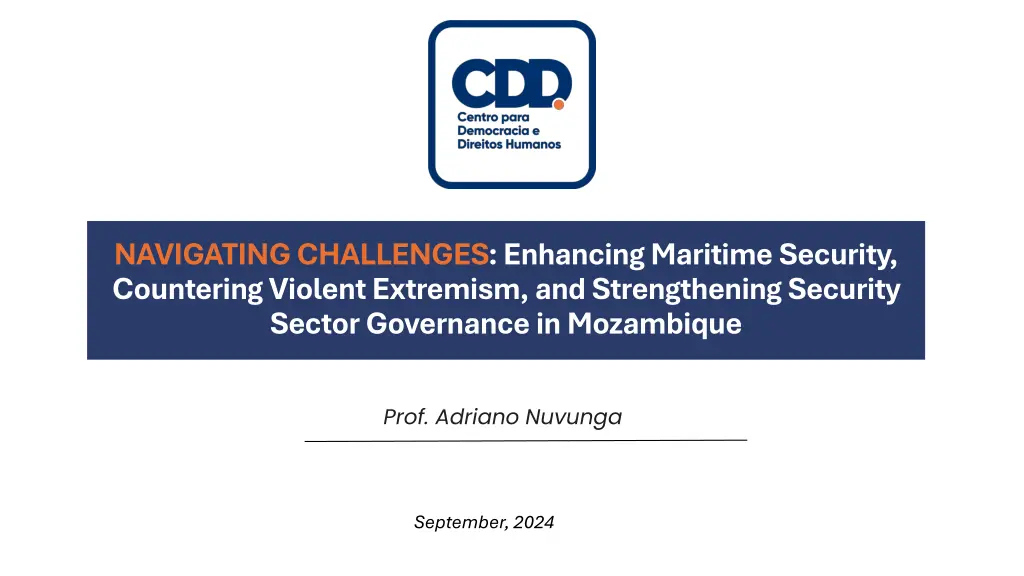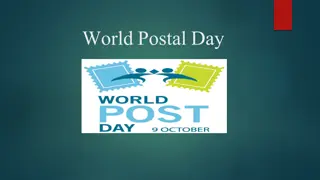
Enhancing Maritime Security and Countering Violent Extremism in Mozambique
Explore strategies to strengthen security, counter violent extremism, and improve security sector governance in Mozambique. Addressing challenges such as maritime security threats, violent extremism in northern Mozambique, and the need for security sector reform to promote regional stability.
Download Presentation

Please find below an Image/Link to download the presentation.
The content on the website is provided AS IS for your information and personal use only. It may not be sold, licensed, or shared on other websites without obtaining consent from the author. If you encounter any issues during the download, it is possible that the publisher has removed the file from their server.
You are allowed to download the files provided on this website for personal or commercial use, subject to the condition that they are used lawfully. All files are the property of their respective owners.
The content on the website is provided AS IS for your information and personal use only. It may not be sold, licensed, or shared on other websites without obtaining consent from the author.
E N D
Presentation Transcript
NAVIGATING CHALLENGES: Enhancing Maritime Security, Countering Violent Extremism, and Strengthening Security Sector Governance in Mozambique Prof. Adriano Nuvunga September, 2024
1. Objective To explore strategies for strengthening security, countering violent extremism, and improving security sector governance in Mozambique, addressing critical challenges promotingregional stability. maritime and
2. Understanding the Context Mozambique s Strategic Location: With an extensive coastline along the Indian Ocean, Mozambique faces growing challenges related to maritime security, including: Piracy and illicit trafficking. Smuggling of arms, drugs, and human trafficking. Illegal exploitation of natural resources, such as illegal fishing and underwater mining. Violent Extremism in Northern Mozambique: The violent insurgency in Cabo Delgado, driven by socio-economic inequality, marginalization, and resource exploitation, poses a threat to both national and regional security. Security Sector Governance: There is a need to strengthen security institutions, ensure accountability, and promote public trust in security forces.
3. Challenges in Maritime Security Piracy and illicit trafficking: The presence of pirates in the Indian Ocean affects commercial routes and coastal security. Limited infrastructure: Lack of technological capacity and adequate maritime patrols in Mozambique s waters. Illegal fishing: Unregulated fishing depletes marine resources, harming the local economy.
4. Solutions for Maritime Security Regional cooperation: Build alliances with other Indian Ocean countries for monitoring and rapid response to incidents. Capacity development: Invest in technology such as drones and satellite surveillance, and strengthen maritime patrol training. Natural resource protection: Strengthen enforcement against illegal fishing and unauthorized resource extraction.
5. Countering Violent Extremism Causes of Violent Extremism: Socio-economic inequality and marginalization. Frustration over lack of economic opportunities. Extremist propaganda and radicalization. Impact of Violent Extremism: Destabilization of the Cabo Delgado region. Displacement of communities and destruction of infrastructure. Jeopardizing investments in natural gas exploration.
6. Strategies to Counter Violent Extremism Socio-economic inclusion: Create economic opportunities for youth and marginalized communities to prevent radicalization. Strengthening international cooperation: Partner with international organizations to share intelligence and coordinate joint operations. Counter-narrative campaigns: Use media to combat extremist propaganda and promote peace and inclusion.
7. Security Sector Governance Importance of Effective Governance: Challenges in Governance: Lack of transparency and accountability. Difficulty aligning national security with human rights. Public distrust of security forces. A well-governed security sector strengthens democracy, protects human rights, and maintains social stability.
8. Strengthening Security Sector Governance Transparency and accountability: Implement monitoring and auditing mechanisms for security sector activities. Training and capacity-building: Professional development for security forces with a focus on respecting human rights and the rule of law. Community engagement: Involve civil society in discussions on security policies, promoting collaborative and participatory approaches.
9. Benefits of Strengthening Maritime Security, Countering Extremism, and Improving Governance Regional stability: Reducing maritime threats and violent extremism creates a safer environment for investments and economic development. Protection of natural resources: Ensures Mozambique s marine resources are preserved for the future. Increased public trust: Greater transparency and accountability build public confidence in security institutions.
10. Strategic Partnerships 01 02 03 Regional and international cooperation: Mozambique should engage with African Union and SADC initiatives for collaborative security. International organizations: Work with the UN, EU, and AU on combating violent extremism and improving governance. Private sector support: Partner with the private sector, especially in protecting investments in natural resources and infrastructure.
11. Conclusion Integrated security: Strengthening maritime security, countering violent extremism, and improving security sector governance are interconnected challenges that require a holistic approach. Mozambique s leadership role: Mozambique must lead by example in addressing these challenges and collaborating with international partners to ensure stability. Vision for the future: A secure, prosperous, and well-governed Mozambique, with protected natural resources and a population that trusts its security institutions.
Thank You for Your Attention!






















